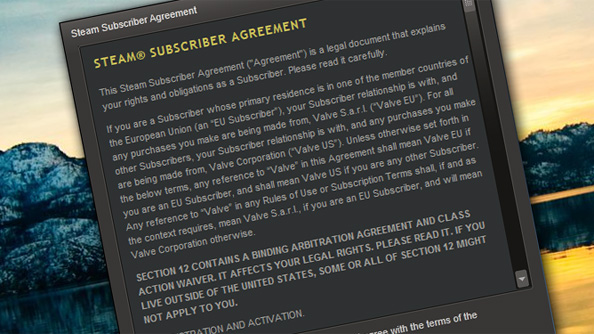Valve have updated their Steam Subscriber Agreement, introducing “a new dispute resolution process” alongside some EU-specific amendments to reflect the opening of a new Valve office in Luxembourg. Interestingly, these new dispute resolution terms disallow any class actions against the publisher – that is, customers with grievances must file their suits individually, rather than as part of a (more powerful) group or consumer organisation. Valve are at least being transparent about blocking this legitimate legal avenue, perhaps understanding the negative press that’s surrounded similar provisions made by other companies such as Sony. Hmm, I had no plans to launch a class action against Valve in the near future, but it was nice to know that I could if I had to.
Valve reckons it’s for the best though. “We think this new dispute resolution process is faster and better for you and Valve while avoiding unnecessary costs,” they write, “and that it will therefore benefit the community as a whole.”
“It’s clear to us that in some situations, class actions have real benefits to customers. In far too many cases however, class actions don’t provide any real benefit to users and instead impose unnecessary expense and delay, and are often designed to benefit the class action lawyers who craft and litigate these claims. Class actions like these do not benefit us or our communities.”
Valve’s tack is a good one: class actions are annoying and lawyers suck, so let’s not bother with them. No matter how reasonably presented the case, however, a reduction in the number of options angry consumers have in resolving mass ire will never be a popular one, and it’s difficult to see how they’re not beneficial to communities.It’s worth noting that class actions are predominantly a US phenomenon, though on top of any legal impact they might have they routinely carry a dramatic heft to them, an “I’m Spartacus” overtone that paints the defendant in an unavoidably villainous light.
Sony faced a class action last year following a high-profile breach of their PlayStation Network, which compromised the details of its 77 million strong community. That suit sought monetary compensation for data loss, credit monitoring costs, and the legal costs in bringing the suit. Sony have since implemented a similar amendment to their terms of use, barring any future class actions against them and forcing consumers to sue for damages individually.
Valve aren’t immune to hacking and neither is your Steam Wallet. Should the unthinkable happen and 30 million users find their credit card details leaked across the internet, it seems that Valve won’t find themselves strongarmed by a consumer rights organisation. It’s slick of Valve to be so open, reasonable and honest about the change and the reasons behind it, but the change is anunfortunate one. Let’s hope it forever remains simply a sticky, well-handledPR moment in history, rather than a practical barrier in the future.
Thanks, the_B
